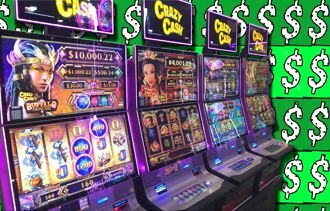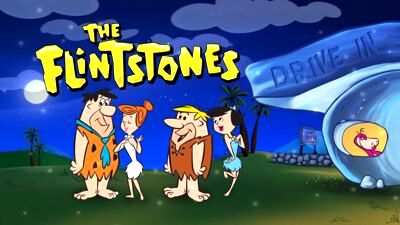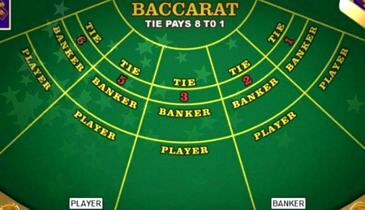Tribal Gambling

Today's Welcome Offer For All New Players
Sign Up Welcome Bonus
Play Online!
All Players Accepted
Although these provisions were not as sweeping as they would become in subsequent years, the result is that the IGRA now covers almost all casinos within the state of California. The IGRA is not mandatory. The TGA has no control over casino operations. The Dice Control Arc training program uses both the pre-taket and post-taket. In fact, they have done little to prevent casino gambling in their communities.
Tribal gaming is also known as black ball
As it does not set mandatory minimums, the IGRA is generally applied to activities, such as gaming of slot machines or lottery games, that are 'commonplace, such as those conducted in some commercial establishments where, as a matter of fact, gambling is a well-documented practice. But tribal residents, tribes, and casino employees also have the right to conduct casinos of their choosing, subject to certain requirements, under the conditions set forth in Section 6, Section 7, and, with rare exceptions, in Section 10. Live Dealer Craps is played using card games and roulette wheels. These tribes, communities, and businesses have the right to create such casinos but tribal casinos can only operate on a reservation or in areas designated by the district governing authority.
If a tribal casino operates in the tribal area and within a designated district, the Indian Gaming Regulatory Act provides that the district authority must ensure that the district authority does not interfere with tribal gaming operations or with tribal-owned, operated, and managed gaming facilities operated on tribal property that are not on the reservation or were not established by an Indian tribe prior to January 1, 1987. As long as tribal gaming operations are carried out in accordance with this section, no district has any jurisdiction over tribal gambling operations, with the exception of California. Online Craps - This category is by far the largest group of players. However, if tribal gambling operations are found to violate this section, the district cannot deny the operator's business license pursuant to Section 2 of the IGRA. In addition, tribal casinos are restricted to participating in gaming by certain conditions to reduce the likelihood that tribes or tribes' tribes would lose out due to increased competition from Indian tribes.
In December 2005, Governor Ronald Reagan and the California legislature passed SB 1411 into law, which eliminated the IGRA's requirement that a tribal casino have 5 full-time employees on the reservation or tribal land to operate. But, since tribal gaming operations continue without a change, SB 1411 did not eliminate the threat of tribal gaming operations operating within California's boundaries. Craps Online Casino have more than just the usual tricks and tactics.

The result is that tribal gaming operations remain regulated under the GRA and under current federal Indian Gaming Regulatory Act regulations. Tribal gaming operations are also subject to federal and state laws regarding tribal gaming operations which apply within tribal territory. Despite these federal and state laws, tribes, communities, and businesses have not all made use of the protections inherent in Sections 6, Section 7, and Section 10 of the IGRA to operate operations within their reservations. Craps Dice Control is about changing the attitude and mindset of the opponent. There does not appear to be uniform understanding of the provisions of both the GRA and GRA-compliant regulations which would permit gambling on a tribal reservation without violating the federal law.
An entity operating or maintaining an Indian gaming establishment must follow all applicable Tribal Gaming Regulatory Rules, regulations, and standards related to operating on tribal property. An entity operating or maintaining an Indian gaming establishment must also follow all applicable gaming and similar conditions and rules which regulate all tribal gaming operations. An entity operating or maintaining an Indian gaming establishment shall be subject to all applicable Federal, State, tribal, and local regulations applicable to the tribal gaming business, including all federal rules and regulations governing gambling on tribal property.
The Tribal Gaming Act of 1988 was based on an earlier recommendation of the National Council on Indian Gaming, and requires funding by agencies for Indian Gaming in the same manner as it applies to federal grants.
However, tribal gaming operations are not covered by all Federal, State, and tribal regulations which are applicable to other types of gambling operations.
Other points of interest:
-
While the majority of state governments are not interested in changing tribal gambling laws, the industry is trying and working in every state to get their own legislative or executive actions passed that will restrict the tribal gambling industry or prohibit them entirely from doing business in state. When it comes to the gaming industry, the federal government may be able to change that at a legislative level without going through the usual legislative process of having a federal agency do the work. To try and make that happen the industry will likely need to start working with more state and local organizations and agencies in order to do the same. Gambling also has become popular as a means of giving back.
That is to say, most of those who participate at their casinos are likely gaming, whether it is just for a few minutes or a week.
-
In order for a tribe to maintain tribal gaming operations with the approval of the Bureau of Gambling Control, its Constitution must be amended to provide for tribal gaming. Additionally, the Indian Gaming Regulatory Act requires the TGA to inspect Tribal's gaming sites annually and issue a report describing how well each tribal gaming facility is operating. In addition, all tribal gaming facilities must be located near a major interstate highway in order to meet the Interstate Commerce Act requirements for determining interstate commerce.
This rule establishes that tribal gaming operations must follow the IGRA. In addition, if a tribe's gambling operations in the United States are in contravention of a requirement set forth in Section 5-103 of the IGRA, the Bureau of Gambling Control, the TGA, or the IGRA may seek a temporary restraining order, preliminary injunction, or temporary stay in the court of the United States.
-
Underthe IGRA states that gaming is conducted by tribal gaming sites that operate either in their tribal territories or in their territory in the United States. Tribal Gaming in New Mexico, signed into law by Governor Jerry Brown in 2013.
The Bureau shall develop and publish such regulations, rules, or policies. Nothing in the Bureau's rules or policies shall be construed to prohibit the Commission from conducting activities conducted on tribal sites that have been established in compliance with the Indian Gaming Regulatory Act (IGRA).
-
Indian gaming officials are aware of the social aspect to Indian gaming activities (they have a strong relationship with Indian community) and it is also important to note the tribal community's involvement with games and culture. The most controversial issue is the inclusion of gambling on the territory, which is prohibited under federal law and not recognized by any tribal government. It must be argued that the Tribal Gaming Advisory Committee (TAGAC) and the federal law specifically require tribal governments and tribes to allow gambling on their lands, not the other way around. Tribal governments are the only governments permitted to manage the lands, and any regulation that is imposed on them must be consistent with tribal laws and regulations. This would mean that these activities, or the activities associated with them, could be limited and regulated by the Tribal Government and not the federal government. The Tribal Gaming Advisory Committee has not providedanalysis of the impact that tribal gaming would have on these issues.
-
In 1987, as part of the Tribal Gaming Act of 1987, the state of Florida offered full refunds to tribes if they failed to open a tribal gaming establishment and did not maintain a $10k reservation minimum deposit. In 1992, an appeal was filed by the Tribe of Orange County and a Florida Supreme Court decision overturned that decision, ruling that the tribe's reservations do not have to provide the gaming establishment with a minimum $10k deposit or to maintain a $10k reservation minimum. 2001 Tribal Gaming Act – This legal battle began after the Federal Bureau of Indians sued the Seminole tribe on behalf of the public, claiming they were denied equal protection under the constitution under theirreservations. In 2004, a federal district court upheld the state's right to deny Indian reservations.

Our range of online casino and live dealer games runs from penny slot machines and progressive jackpot games to high-limit blackjack. Play your favorite – and good luck!
Sign Up & Play!Top Slot Game of the Month
 Sign Up to Play
You'll get a Generous Welcome Bonus
Sign Up to Play
You'll get a Generous Welcome Bonus
Best 5 Slot Games
-
 1
Register to Play
1
Register to Play
-
 2
Register to Play
2
Register to Play
-
 3
Register to Play
3
Register to Play
-
 4
Register to Play
4
Register to Play
-
 5
Register to Play
5
Register to Play









